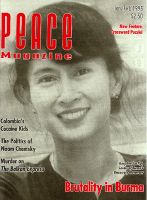
Peace Magazine Jan-Feb 1995, page 5. Some rights reserved.
Search for other articles by various here
I wondered about two articles in the Sept/Oct issue.
I can't see a progressive person wanting the Lamas back in power in Tibet. When Tibet was a theocracy there was no concept of democracy or human rights. For the average citizen, I suspect life was about as repressive as it is today.
Valerie Smith's article on TV violence singles out CITY TV. I'm no expert on television, but I've noticed a lot more violence on the American stations and the Canadian networks that carry American shows.
George Goldberg, Toronto
"No Army," (Sept/Oct) the brief produced by Science for Peace's Defence Policy Advisory Group (DPAG), is a valuable document. Many of its major features should appeal to those concerned with programs leading to elimination or severe reduction of Canada's armed services. There is, however, at least one matter in the brief that invited comment. The statement that "where (warring) parties have agreed to suspend hostilities, they can be kept from combat by a corps of civilians" raises important ethical questions.
In fact, what basis is there for this statement? Why should anyone suppose - given the recent experiences of UN-brokered exercises in peacekeeping that violent, mutually hostile forces, often including ill-led rabbles of uncertain political or ideological persuasion, would display the slightest respect for, or restraint towards, a corps of civilian peacekeepers?
Imagine the arrival of such a corps, replete with food, medicines (including drugs), beds, tents, drinking water. Who could doubt that the more undisciplined, fringe members of opposing armies would simply loot the corps supplies for whatever they desired? Hostage taking, murder, and rape could be assumed. Why should anyone think otherwise?
In asking and permitting unarmed civilians to undertake peacekeeping duties that are currently performed with utmost difficulty by armed U.N. personnel, nations would be exposing their citizens to appalling risk. It is not ethically justifiable to expect anyone to bear such risks. I would personally oppose deployment of a corps of civilians even if willing volunteers were found to constitute it.
In case members of the DPAG have in mind a Gandhian model of successful use of nonviolence to achieve a political end, they might consider the actual events and procedures underlying Gandhi's campaigns. Howard Gardner recently pointed out that Gandhi's techniques, though very effective in the dying days of the British in India, would be unlikely to have worked against more ruthless and fanatical forces -such as Hitler's S.S.
It seems irresponsible to expect unarmed civilians, no matter how well trained in political skills, conflict resolution, medicine, public health, and disaster relief, to go among dangerous hordes without recourse to self-defence when needed. I grant that "combat training brutalizes" in its present form. But there is no clear reason why the military, or whatever organization succeeds it, should not be assigned a new mandate and trained in peacekeeping in the sense recommended by the DPAG, while still retaining the capability of defending the lives of its own members if threatened and simultaneously providing an effective defence for such targets as helpless civilians, or the disarmed or wounded, whom they may encounter in the course of their duties.
Alan H. Weatherley, Toronto
Alan Weatherley in his piece ("Of Vertebrates and Violence," Nov/Dec) suggests that "the U.S. is a disturbed society that sees itself as threatened." Indeed. But not from the outside, not any more anyway. If there is any threat, it stems from the powerless. Frustration resentment, poverty create powerlessness. It will seek an outlet via violence.
This is basically an aggressive society which makes no attempt to ameliorate the current situation. What with capital punishment, no effective gun control, and no enforceable voter registration, they end up with a congress representing something like 25% of the voting population. The system is self-perpetuating and produces only fear which in turn manifests itself as a sense of threat.
And that is where we came in....
The Rt. Rev. Dr. B. Osborg, OSL, Ultima Libertas, Bridgetown, Nova Scotia

Peace Magazine Jan-Feb 1995, page 5. Some rights reserved.
Search for other articles by various here